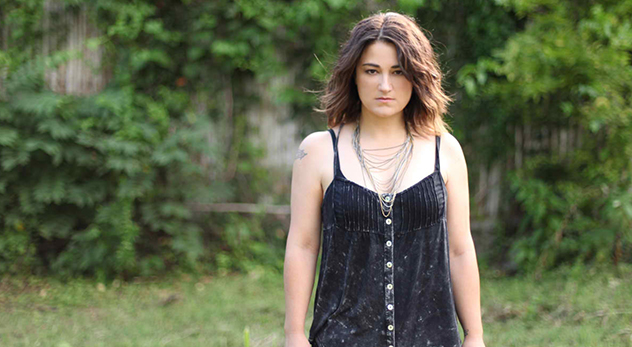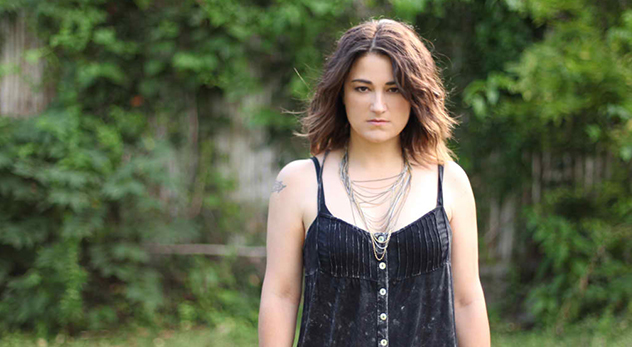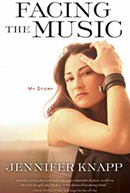
The Grammy-nominated Christian artist and lesbian has released a new album and tell-all memoir. – Image courtesy of Invasion Group
Conversing with Jennifer Knapp is like listening to NPR. Her tone is lush, almost comforting, and her words are measured. You can almost hear her smiling. Even when I ask difficult questions or push back, she remains unflappable. An uninformed eavesdropper would never guess from Knapp’s demeanor that the one-time Christian superstar has been embroiled in controversy for more than four years after revealing she was gay.
Knapp’s storied career as a Christian singer and songwriter culminated in a gold album, Grammy nomination, and an appearance at Lilith Fair music festival, but her announcement shocked many fans and drew the ire of some conservative Christians who believe that the “homosexual lifestyle” is sinful.
This month, Knapp walks back into the furnace with the release of a mainstream folk album, “Set Me Free,” and a tell-all memoir, “Facing the Music: My Story.” Here, we discuss her sexuality, the scrutiny she’s been under, and which lyric she wishes she could change.
RNS: You talk a lot about your past—family drama, depression, alcohol, sexual encounters. Some conservative Christians might say that your past has shaped who you are today in terms of your sexuality. Has it?
JK: I don’t know that I would say that my past has made me into the lesbian that I am today as if A plus B equals lesbian. I don’t really subscribe to that kind of way of thinking. And after all the soul searching I’ve done in my life, I wouldn’t come to that conclusion. Having said that, I’m a real proponent of the idea that the history of our experiences creates the person we are in the present.
RNS: You tell a story in the book about not allowing one of your songs to be used in a “True Love Waits” abstinence campaign. Why?
JK: I hope the fallout isn’t that I think abstinence is a lost cause. That was about the way we approach this issue and what I think is a better understanding of the value of what abstinence means. This is largely based on my own experience. Listen, yes, I’ve had sex with people. Is there really value in shaming me into abstinence? Or rather should you give me an idea of the value of my body and person the value of the people opposite me that I might have a sexual encounter with?
Abstinence is a very noble virtue. I spent a decade abstinent and in that time, I absolutely got a sense of why that was important and why giving my body away was less than ideal. But if you just told me not to have sex and then shamed me if I did, it would be different. Christians often end up creating ideals rather than establishing schools of thought that are deliberate about why purity is important for health and well being and compassion to each other.
RNS: But many Christians—even some gay and lesbians—believe the Bible teaches abstinence outside of marriage. Do you?
JK: I can understand where that thinking comes from. But I don’t know that there are hard and fast lines. For example, what if there is no government to negotiate a marriage contract? Does that invalidate one’s commitment to another person? I realize this sounds esoteric, but it’s important. What about those who are partnered for life but aren’t institutionally married? Those people say that a covenant has been made for their union. That’s one of the issues I have with abstinence. I’m not advocating for people to have sex whenever they want. I don’t believe in that. [tweetable]Monogamy is a standard that I enjoy and am passionate about.[/tweetable]
RNS: There are a lot of LGBT Christians who’ve chosen, based on their faith convictions, to remain celibate. What do you say to them?
JK: I say, “great.” Why would I tell them to go out and have sex? I know people who, because they can’t be in a heterosexual relationship, believe it is their honor and duty to be holy before God as an abstinent person and never seek a same-sex relationship. I appreciate that. I haven’t chosen that for myself, but I have to value that story and journey. There’s value in letting someone’s journey be what it is for that person for the sake of their wellbeing.
I happen to be on the side that believes that the covenant we have with a lover or friend is a standard that isn’t based on gender or sexual orientation. But it is a mistake to say, “You’re wrong because I don’t agree with you.” Their journey should be respected and we shouldn’t say that people’s choices have no value to their spiritual journey just because we disagree with them.
RNS: If you could take back one lyric from a song you wrote, what would it be?
JK: I would probably want to go back and edit pretty much the entire chorus to “The Way I Am.” The chorus says, “It’s better off this way, to be deaf, dumb, and lame then to be the way I am.” I would probably edit that. I meant that sarcastically. [tweetable]It’s tragic that we break ourselves in half to be usable before God.[/tweetable] I actually don’t play that song live anymore because I don’t want people to think they are anything less than they are.
RNS: What would you like Christians to know about your current relationship with your partner?
JK: In the early years of having met my partner, I would get up every day and be amazed. I would look at this person and something would well up in my heart and say, “I love you, and I want to take care of you. I want to watch you grow and be there when you struggle.” I wanted to care for her in a deeper way than anyone ever taught me. It’s not about sex or gender, it’s about complete utter compassion for another human being. At the beginning, when your hormones are flying, you think it won’t last. And everyone told me that one day we’d be old codgers who hate one another and want to get a divorce. Much to my amazement, I still have that same drive. It’s my partner for me and me for my partner. And having understood love and patience and vulnerability has opened me up to the world and a greater understanding of the Gospel.
RNS: Do you two attend church?
JK: No.
RNS: You tell of being under scrutiny as a Christian musician even saying “wearing a tank top on a hot day could incite criticism.” Do you think American Christians tend to be judgmental rather than gracious?
JK: I always think that is an easy charge toward the Christian community because there is a high standard for the way we live. I step back and remember that it is kind of human nature. Any time we see something we don’t agree with or perceive as negative, it is extremely easy to judge other people. But I don’t think that Christians are extraordinary in this way.
RELATED: “Is the Christian Music Industry Liberalizing on Gay Marriage?”








